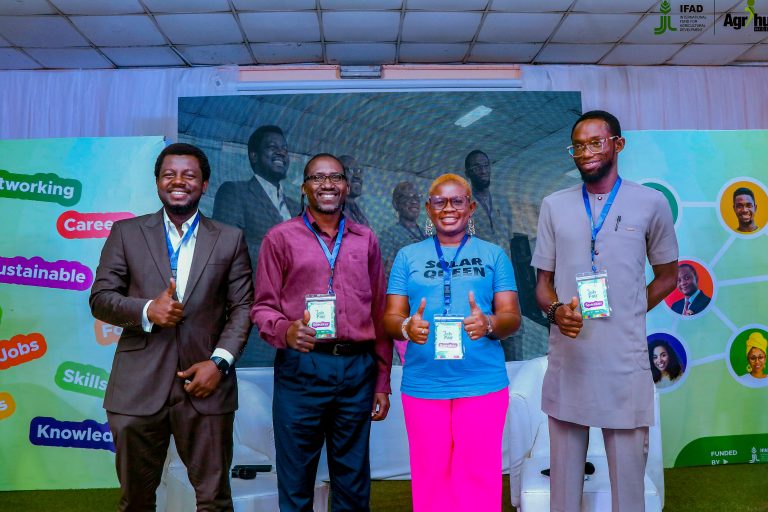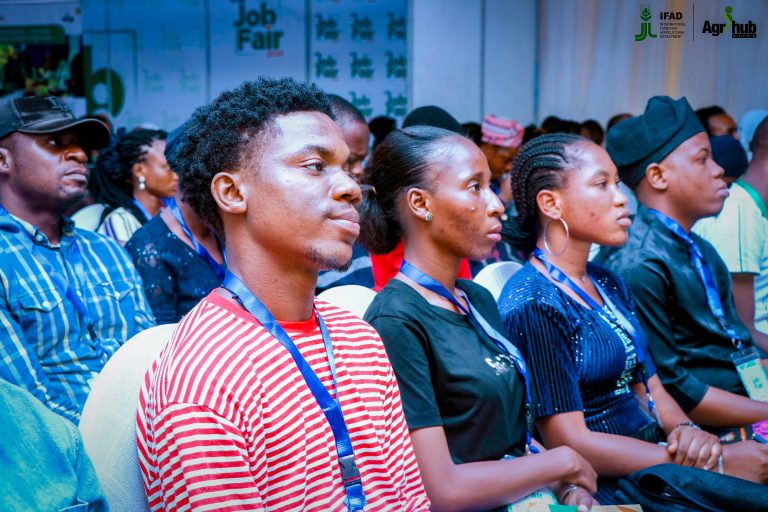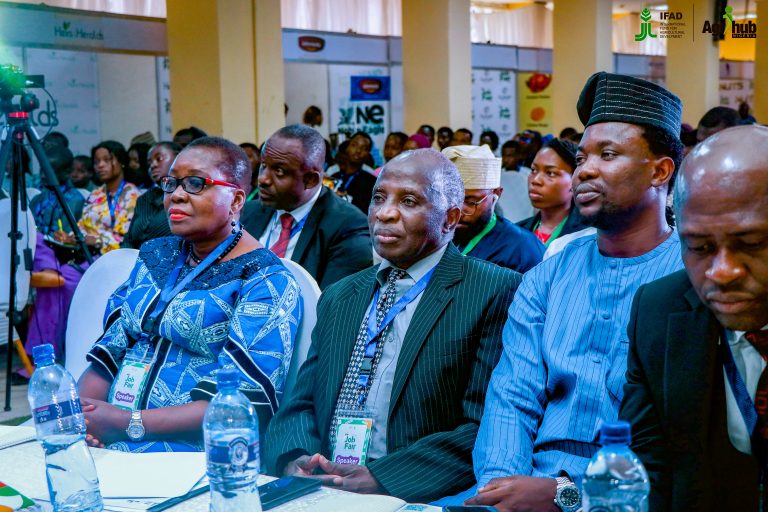The IFAD Agrihub project, a key initiative implemented by IITA, played a pivotal role in hosting a job fair in Ibadan, Oyo State. This project, which focuses on employment and entrepreneurship tracks, was instrumental in facilitating job linkages and reducing youth unemployment in the agricultural sector. It underscores the importance of youth empowerment in driving the growth and sustainability of the agribusiness sector.
With substantial funding from the International Fund for Agricultural Development (IFAD), Visa Foundation, and BMZ, the IFAD Agrihub project has been a resounding success. Its employment and entrepreneurship tracks have created sustainable employment and profitable enterprises for over 4,800 youths in agriculture-related activities. This success story is a beacon of hope, signaling a promising future for youth employment in the agricultural sector.
The fair, held on 26 September at the University of Ibadan International Conference Center, was significant. About 300 youths, several business owners in the agro-sector, and other stakeholders attended. The fair’s theme, “Empowering Youth for Sustainable Agri-food Careers: Skills and Opportunities,” underscored the urgency and relevance of the event in the context of youth employment in the agricultural sector.
At the fair, employers from the agro-sector engaged with the participants, who were trained in the value chain of different commodities by the IFAD Agrihub project. The available positions ranged from farm managers and accountants to data analysts and supply chain supervisors, among several others. The fair also featured workshops on agribusiness management, entrepreneurship, and the future of agriculture, providing a comprehensive view of the sector and its opportunities. These workshops covered topics such as financial management, market analysis, and the use of technology in agriculture, equipping the participants with the necessary skills for a successful career in the agro-sector.
The keynote speaker, Executive Director of Greenport Nigeria Edobong Akpabio, advised young people to choose a career over a job in the agricultural sector. She emphasized that a career in agriculture, whether in farming, agribusiness, or agricultural technology, would provide them with a sense of purpose, financial stability, and personal fulfillment in the long term.
Akpabio, who spoke on “Creating a career, not just taking up roles in the agricultural sector,” described agriculture as the most sustainable sector, noting that being a player in the sector is not limited to farming.
She added, “We are encouraging young people looking for sustainable careers to look at the agro-sector, and they should look beyond getting jobs. A job makes you focus on salary; the world has moved beyond that. You can be more useful to yourselves, other people, and your country. Many of the career opportunities employers need in 2024 have less than 20 percent to do with production. There is a lot outside of production, and those gaps must be filled.
“Based on findings, top careers in the agro-sector in 2024 include agriculture finance professionals, animal scientists, veterinary professionals, soil scientists, renewable energy specialists, water resources experts, robotics experts, marketing professionals, agro-extension professionals, agro-insurance professionals, beekeepers, supply chain professionals, farm safety experts. The careers in the agro-sector are many.
“However, to succeed in this sector, people must be accountable, spiritual and passionate, have integrity, know how to cultivate relationships, and excel at what they do. Even if they didn’t study agriculture in school, there are platforms in the agricultural sector where their education will be useful. There are gaps they can fill, and they can be happy doing it, and they can earn money and lead a good life.”
She said further that young people going into agriculture shouldn’t be discouraged by capital, noting that they could start small and grow their enterprises with time.
While highlighting the motivation for the fair, the Coordinator of Technologies for African Agricultural Transformation (TAAT) at IITA, Chrysantus Akem, said that in recognition of the importance of youth, the IITA Youth in Agribusiness Office was established to link young people to opportunities, build their capacity across the different value chains and support them in their respective enterprises.
He added, “IITA is known as a leading research institute, but in addition to that, we try to deliver what comes out of the research to the end users, including young farmers. The unit (IYA) was created primarily to bring youths into agriculture and change their mindset so they can see agriculture as a business and not a chore. I believe the youths are the future of agriculture.”
Meanwhile, IFAD said it was delighted that the project had surpassed expectations. A representative from its headquarters in Rome, Hisham Zehni, said: “This is just one example of how our collective efforts are empowering young people and communities, particularly women. The job fair is a critical step in continuing this mission. The potential is vast, and with the support of private sector partners, government agencies, and the youth, we can continue to unlock new opportunities and drive new growth.”
He also described the recent launch of the IFAD Agrihub Job Portal as a powerful tool that would bridge the gap between young talents and opportunities within Nigeria’s growing agro-sector.
Similarly, Ekoue Dede, IFAD Country Director in Nigeria, said the job fair was a unique opportunity to form partnerships between potential employers and youths interested in getting jobs and business opportunities in the agribusiness sector.
She added, “We want to say that IFAD’s commitment to promoting youth in agriculture is firm. IFAD Agrihub was born out of this commitment, and we have been privileged to witness some of the key results achieved by the IFAD Agrihub project. We think this is a moment to celebrate that IFAD Agrihub achieved more than 100 percent of the original program targets. “We believe in the transformational power of the youth in agribusiness. This is our plea as IFAD: Let us harness the potential of the youth.”
Speaking on the impact of the IFAD Agrihub project so far, the project coordinator, Omotomiwa Adesanya, said 3,946 youths across 19 states had been trained, out of which 908 had established their businesses. The youth-led agribusinesses also created an additional 1,352 jobs. He added that the project had facilitated the employment of 2,570 youths, with 54 percent female participation.
Adesanya added, “Over the years, we have trained youths and connected them with companies in the agricultural value chain for employment, while we have supported some to start their businesses. However, this job fair benefitted other youths, so we opened it to all youths. Also, by interacting with the employers, they will become familiar with the skills that are in demand. We brought some of our partners so they could interact and ultimately employ the participants with the required skills.”
The program also featured two-panel sessions. The first topic, “Sustainable agri-food careers: Making a difference through Green Innovations,” had Samson Ogbole, a renowned agripreneur, Damilola Asaleye, an agribusiness consultant, and Idowu Osun, a sustainable agriculture advocate, as members. They expatiated the potential of green innovations in the agri-food sector and how they can create sustainable careers. The second session, with the topic, “Essential skills to build for career opportunities in the agri-food sector,” had Olawale Ojo, a human resource expert, Chidinma Mary Ezeh, a successful agribusiness owner, and Tajudeen Yahaya, a career coach as members. They shed light on the skills needed to excel in the agri-food sector and how to build them.



Contributed by Babatunde Ajaja

